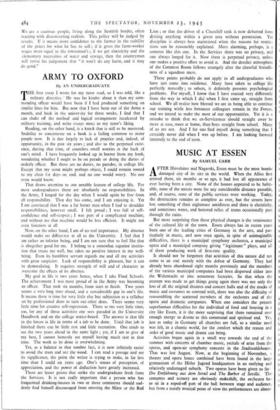ARMY TO OXFORD
By AN UNDERGRADUATE
THE first essay I wrote for my tutor read, so I was told, like a military directive. ' He was far kinder about it than my com- manding officer would have been if I had produced something on similar lines for him. But now that I have been out of the Army a month, and back in the university for three weeks, I find that I can shake off the method and logical arrangement inculcated by military training, and write essays more to my tutor's liking.
Reading, on the other hand, is a knack that is still to be mastered. Inability to concentrate on a book is a failing common to many people now. It is due largely to lack of practice and, indeed, of opportunity, in the past six years ; and also to the perpetual exist- ence, during that time, of countless small worries at the back of one's mind. I have frequently looked up in horror from my book, wondering whether I ought to be on parade or doing the duties of orderly officer. But there are no duties, no parades, in college life. Except that my scout might perhaps object, I could remain rooted to my chair for days on end, and no one would worry. No one even would know.
That draws attention to one notable feature of college life. For most undergraduates there are absolutely no responsibilities. In the Army, I longed for the day when I would again be free from all responsibility. That day has come, and I am enjoying it. Yet I am convinced that I was a far better man when I had to shoulder responsibilities, however small. I felt proud ; I was full of self- confidence and self-respect ; I was part of a complicated machine, and without me that machine would be less efficient. It might not even function at all.
Now, on the other hand, I am of no real importance. My absence would make no difference at all to the University. I feel that I am rather an inferior being, and I am not sure that to feel like that is altogether good for me. I belong to a somewhat superior institu- tion that treats me well, but takes no positive interest in my well- being. Even its humblest servant regards me and all my activities with great suspicion. Lack of responsibility is pleasant, but it can be demoralising. It requires strength of will and of character to overcome the effects of its absence.
My goal in life is two years hence, when I take Final Schools. The achievement I was most proud of in the Army was becoming an officer. That took six months, from start to finish. Two years seems a very long time ahead, and a considerable gap in one's life. It means there is time for very little else but subjection to a syllabus set by professional dons to turn out other dons. There seems very little time for creative self-expression. There se mis very little time, too, for any of those activities one sees paraded in the University Handbook and on the college notice-board. The answer is that life in the forces is life in terms of a job to be done. Until that job is finished there can be little rest and little recreation. One tends to see the two years ahead in the same light ; yet, if I am to give of my best, I cannot honestly see myself having much rest in that time. The work to be done is overwhelming.
Yet, as a balance to that sombre fact, it is now infinitely easier to avoid the trees and see the wood. I can read a passage and see its significance, the point the writer is trying to make, in far less time than I could six years ago. One's senses of perception, of appreciation, and the power of deduction have greatly increased.
There are lesser points that strike the undergraduate fresh from the Services. It is not really important that a person who has frequented drinking-houses in two or three continents should sud- denly find himself discouraged from entering the Mitre or the Red
Lion ; or that the driver of a Churchill tank is now debarred from driving anything within a given area without permission. Yet discipline is always best maintained when the reasons for restric- tions can be reasonably explained. More alarming, perhaps, is a contrast like this one. In the Services there was no privacy, and one always longed for it. Now there is perpetual privacy, unless one makes a positive effort to avoid it. And the derelict atmosphere of the Common Room follows strangely after the cheerful friendli- ness of a squadron mess.
These points probably do not apply to all undergraduates who have just come into residence. Many have taken to college life perfectly naturally ; to others, it definitely presents psychological problems. For myself, I know that I have reacted very differently from the way in which I did when I first came up, straight from school. We all realise how blessed we are in being able to continue our training while less fortunate colleagues remain in the Forces, and we intend to make the most of our opportunities. Yet it is a mistake to think that we ex-Servicemen should straight away be more at ease, more at home, than boys straight from school. Many of us are not. And I for one find myself doing something that I certainly never did when I was up before. I am looking forward intensely to the end of term.


























 Previous page
Previous page